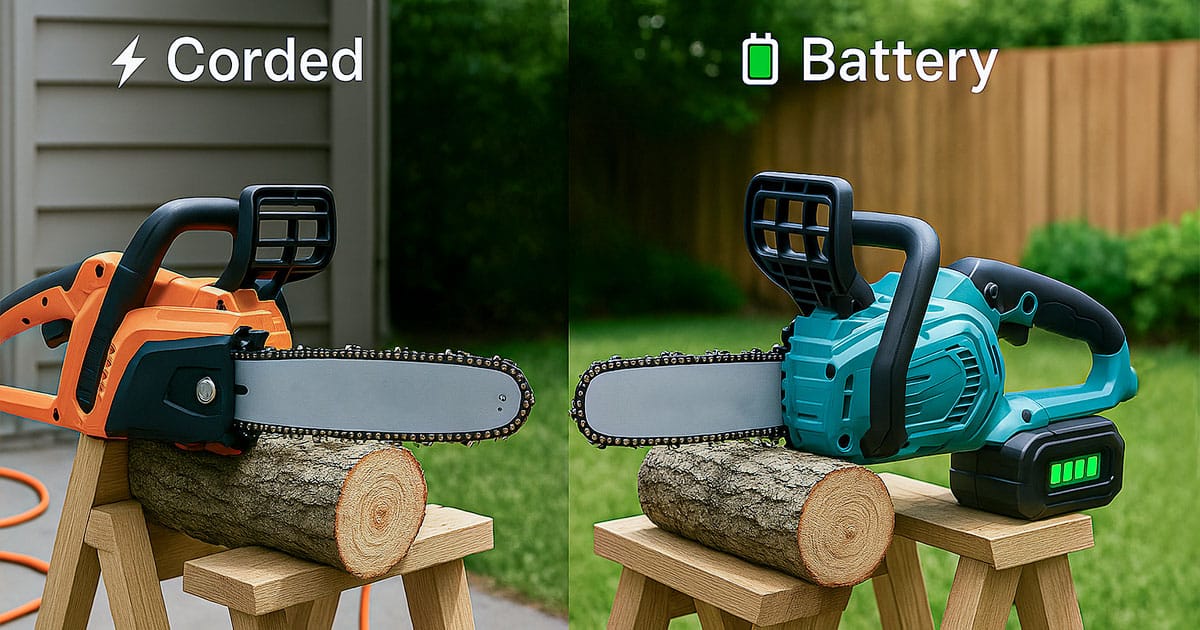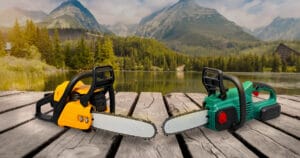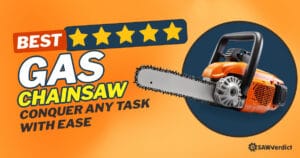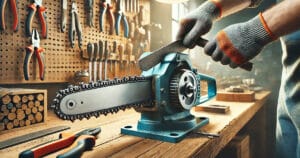Choosing between a corded vs battery chainsaw can be confusing. You might not know which one suits your needs. Power, ease of movement, price, and safety are important factors to consider. Do you want steady power or the ability to move freely? Both types have their advantages. Learning their differences will help you choose wisely. Read on to find the chainsaw that fits your work and style.
Table of Contents
Performance and Power Comparison
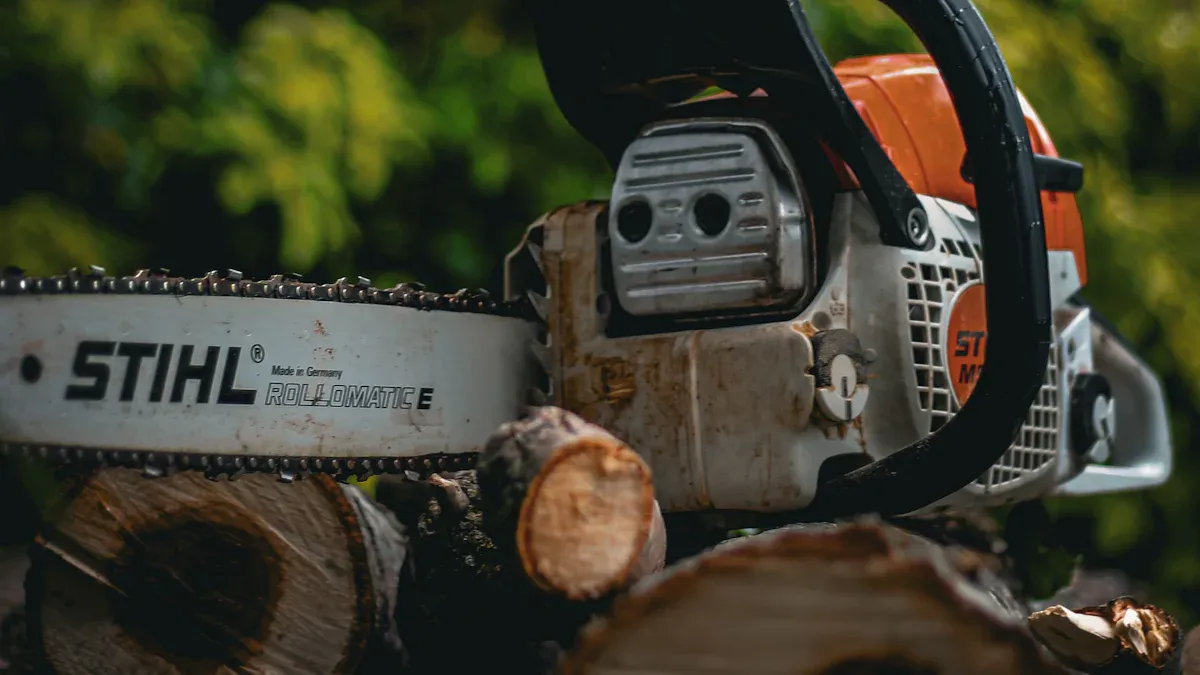
Power and Cutting Strength of Corded Chainsaws
Corded chainsaws are very strong and reliable. They plug into an outlet, giving steady power. For example, the Dewalt 15 Amp Brushless 18 in. Corded Electric Chainsaw has 2.8 HP and a 15-amp motor. It can reach speeds of 12 m/s, making it great for cutting thick logs or hardwood.
These chainsaws also cut well with an 18-inch guide bar. They easily handle logs up to 13 inches wide. Features like self-sharpening blades save time on maintenance. Sharpening takes only 3 to 5 seconds. If you need constant power for tough jobs, corded chainsaws are a smart choice.
Power and Cutting Strength of Battery Chainsaws
Battery chainsaws have a different kind of power. They may not be as strong as corded ones, but they cut fast. For instance, the EGO Power+ CS2005 cuts wood in about 3.25 seconds. Its average cutting time is 3.45 seconds, which is impressive for a battery tool.
These chainsaws are portable and easy to use. Models like the Stihl MSA series show how advanced batteries have become. Depending on the battery, energy use ranges from 2.45 to 4.50 Wh per cut. If you want a cordless tool with good cutting strength, battery chainsaws are worth a look.
Consistency and Efficiency in Different Tasks
Both corded and battery chainsaws are consistent, but in different ways. Corded chainsaws work nonstop as long as they’re plugged in. They’re great for long tasks and don’t lose power over time. This makes them better than gas chainsaws, which can fade during use.
Battery chainsaws are efficient for quick jobs. Modern batteries keep their cutting power steady while charged. They don’t cut as fast as gas chainsaws, which can reach 20 inches per minute. But they are smoother and easier to use. Whether trimming branches or cutting firewood, battery chainsaws do the job well.
Choosing between corded and battery chainsaws depends on your needs. Do you want strong, steady power or easy portability?
Portability and Runtime
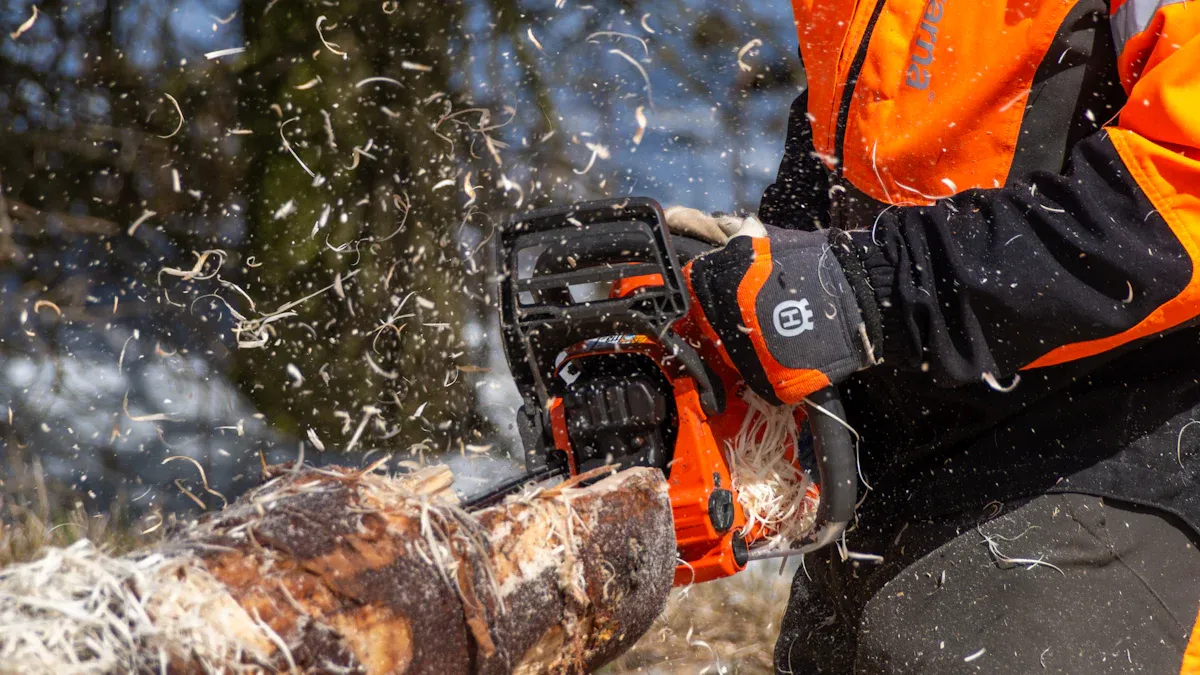
Movement and Limits of Corded Chainsaws
Corded chainsaws are strong but not very portable. They need to stay plugged into an outlet, which limits movement. If you’re in a big yard or far from power, dragging a cord can be annoying. These chainsaws work best in small areas with nearby outlets.
Corded chainsaws give steady power but are less handy outdoors.
If you’re cutting firewood near your house, a corded chainsaw works well. But for jobs needing more movement, the cord might get in the way.
Freedom and Runtime of Battery Chainsaws
Battery chainsaws are great for moving around. You don’t need to find an outlet to use them. Newer batteries last longer, making these chainsaws good for many tasks.
Here’s a quick look at some popular models and their features:
| Brand | Model | Key Features | Runtime/Performance Metrics |
|---|---|---|---|
| Stihl | MSA 300 C-O | 45 minutes of heavy cutting, 30% longer runtime | 45 minutes heavy cutting, 30% longer runtime |
| Husqvarna | T540i XP | Special motor design, battery-saving system | 20 dB quieter, 85% speed of gas chainsaws |
| Milwaukee | MX FUEL Chainsaw | New motor design, adjusts torque automatically | 150 hardwood cuts per charge, 25% faster chain |
| Makita | XCU08PT | Dual 40V batteries, smart protection system | 6,500 RPM speed, 35% longer battery life |
| EGO Power+ | CS1800 | 56V battery, heat control system | 380 cuts in 4×4 wood, 20% more torque than 40V |
With these upgrades, battery chainsaws now last longer and work better. They’re a good choice for both small and big jobs.
Best for Moving Tasks
Battery chainsaws are best for tasks where you move around. They’re light, usually about 10 lbs, and easy to carry. This makes them great for trimming branches or pruning trees.
Many people like that batteries can be swapped. When one battery dies, you can replace it and keep working. This is helpful for both professionals and DIY users.
Battery chainsaws are portable and simple, perfect for outdoor work.
Whether in your yard or far away, a battery chainsaw gives you the power and freedom you need.
Maintenance and Ease of Use

Maintenance Needs of Corded Chainsaws
Corded chainsaws are pretty straightforward when it comes to maintenance. You don’t have to worry about fuel or batteries, which makes upkeep simpler. The main thing you’ll need to check is the saw chain. Look for signs of wear and ensure it’s properly lubricated. This process is quick and easy, so you can spend more time cutting and less time tinkering.
Another perk is the lack of complex parts. Unlike gas chainsaws, corded models don’t require air filter replacements or fuel mixture checks. This means fewer headaches and lower long-term costs. If you’re someone who prefers tools that don’t demand much attention, a corded chainsaw might be your ideal match.
Maintenance Needs of Battery Chainsaws
Battery chainsaws take simplicity to the next level. Their maintenance revolves around keeping the battery charged and occasionally replacing it when needed. You’ll also need to check the saw chain for wear and lubrication, but that’s about it. No cords, no fuel, no fuss.
These chainsaws are designed for convenience. You won’t have to deal with the ongoing expenses of fuel or oil, which saves money over time. Plus, modern batteries are built to last longer, reducing the frequency of replacements. If you value hassle-free upkeep, battery chainsaws are hard to beat.
Ease of Setup and Operation
Both corded and battery chainsaws are easy to set up, but battery models offer unmatched simplicity. With a corded chainsaw, you’ll need to find an outlet and manage the cord while working. It’s not difficult, but it can feel limiting if you’re moving around a lot.
Battery chainsaws, on the other hand, are ready to go as soon as the battery is charged. They’re lightweight and portable, making them perfect for quick tasks or jobs in hard-to-reach areas. You’ll appreciate how intuitive they are to use, even if you’re new to chainsaws.
Tip: If you want a tool that’s easy to maintain and operate, battery chainsaws are a great choice for on-the-go tasks.
Cost and Long-Term Investment
Initial Costs of Corded Chainsaws
Corded chainsaws are usually cheaper to buy at first. They cost less because they don’t need pricey batteries or chargers. Most corded chainsaws are priced between $50 and $150. If you want a strong tool without spending too much, this is a good choice.
You might need to buy a long extension cord. A sturdy cord helps you work without losing power. While this adds a small cost, corded chainsaws are still more affordable overall.
Initial Costs of Battery Chainsaws
Battery chainsaws cost more when you first buy them. You pay for the chainsaw, battery, and charger together. Prices often start at $150 and can go over $500 for high-end models. The advanced batteries make these tools more expensive.
Some brands let you use the same battery for other tools. If you already own tools from the same brand, this can save money. Battery chainsaws are a smart buy if you want a cordless tool collection.
Long-Term Value and Durability
Both corded and battery chainsaws have good long-term value. Corded chainsaws last a long time with little upkeep. You won’t need to replace batteries, which keeps costs low. Take care of the chain and motor, and it will stay dependable.
Battery chainsaws are portable and easy to use. Modern batteries last through many charges before needing replacement. Though batteries cost more, the freedom they give is worth it. If you want flexibility and don’t mind spending more upfront, battery chainsaws are a great investment.
Safety and Environmental Impact
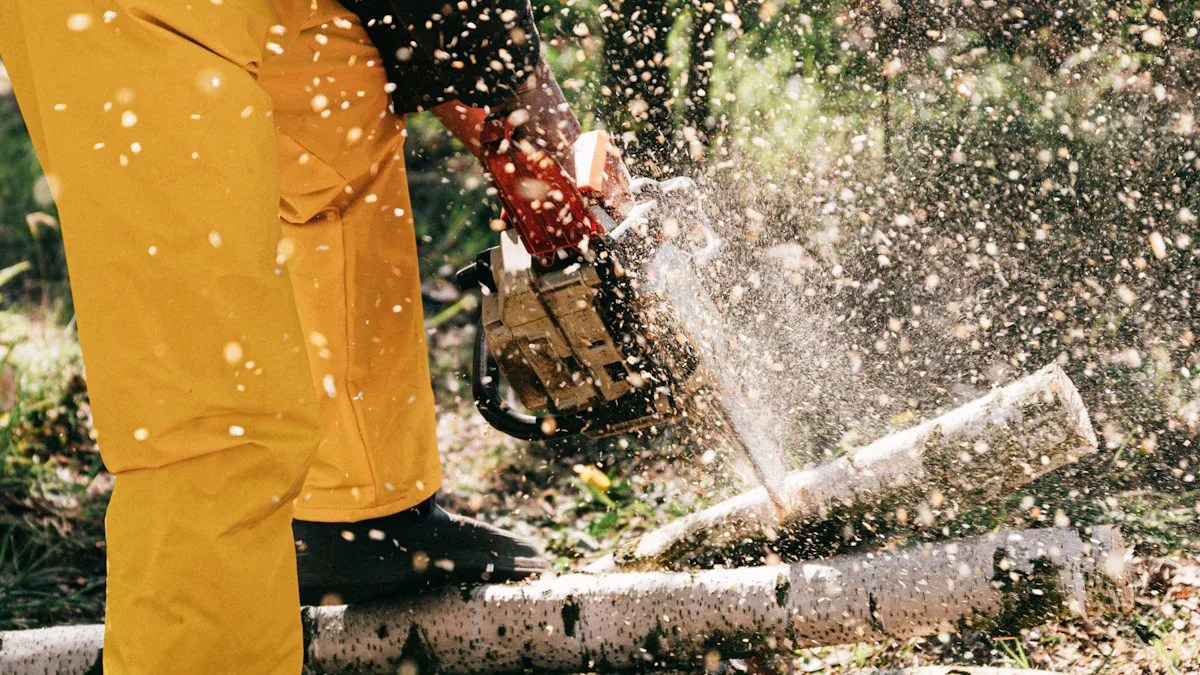
Safety Features of Corded Chainsaws
Corded chainsaws have safety features to keep you protected. Many include a chain brake that stops the blade quickly if needed. This helps prevent accidents while you work. Hand guards are also common, shielding your fingers from flying debris or the chain.
A steady power supply is another safety benefit. Unlike gas chainsaws, corded ones don’t lose power suddenly or stall. This lets you focus on cutting without interruptions. However, you must be careful with the cord. Tripping over it or cutting it by mistake can be dangerous. Always keep the cord away from your workspace.
Safety Features of Battery Chainsaws
Battery chainsaws are made with safety in mind. They don’t have cords, so tripping or tangling is not risky. This makes them easier to use, even in tight or uneven areas. Many models also have chain brakes and anti-kickback systems for added safety.
These chainsaws are lightweight, making them simple to control. Their lighter weight reduces tiredness, lowering the chance of accidents. Without fuel tanks, there’s also less risk of fire. If you want a safe and easy-to-use tool, battery chainsaws are a great option.
Environmental Considerations and Noise Levels
Battery chainsaws are better for the environment. They don’t release emissions, helping you be eco-friendly while working. They’re also very quiet, which reduces noise pollution. This makes them perfect for neighborhoods or areas with wildlife. You can use them early or late without bothering anyone.
Corded chainsaws are quieter than gas ones but still need electricity. The environmental impact depends on how your electricity is made. They don’t produce fumes, but they may rely on non-renewable energy. If you want a quiet and eco-friendly tool, battery chainsaws are the best choice.
🌱 Tip: Battery chainsaws are quiet and eco-friendly, great for sensitive areas.
Best Use Cases
When to Choose a Corded Chainsaw
Corded chainsaws are great for jobs needing strong, steady power. They work well for cutting big logs, chopping firewood, or felling trees. As long as they’re plugged in, they won’t lose power. You don’t have to worry about batteries running out during tough tasks.
Here’s a simple guide for when corded chainsaws are best:
| Scenario | Why It Works |
|---|---|
| Heavy-duty tasks | Strong power for cutting thick materials |
| Close to an outlet | Perfect for jobs near a power source |
| Reliable performance | Keeps cutting strength steady for hard projects |
If you’re working near electricity, corded chainsaws are very dependable. They’re ideal for jobs needing constant power and accuracy.
Tip: Use a good extension cord to keep power steady and avoid drops.
When to Choose a Battery Chainsaw
Battery chainsaws are perfect for moving around easily. They’re great for medium tasks like trimming branches or pruning trees. If there’s no outlet nearby, these chainsaws let you work freely without cords.
Here’s why battery chainsaws might be better for you:
- Easy to carry and use in different places.
- Quiet operation, great for areas sensitive to noise.
- Lightweight design makes them simple to handle.
- No fumes, making them better for the environment.
Battery chainsaws are portable and convenient. Modern batteries last long enough for most jobs. Plus, they’re quiet, so you won’t bother neighbors or animals.
🌱 Note: Battery chainsaws are eco-friendly and help lower your carbon footprint.
Matching Chainsaws to Your Needs
Choosing the right chainsaw depends on your tasks and location.
For heavy-duty work in one spot, pick a corded chainsaw. It’s powerful and reliable for tough jobs. If you need something portable, go with a battery chainsaw. It’s easy to use and works well where there’s no electricity.
Here’s a quick comparison:
| Chainsaw Type | Best For | Main Benefit |
|---|---|---|
| Corded Chainsaw | Big, stationary tasks | Strong, steady power |
| Battery Chainsaw | Mobile, medium tasks | Easy to carry and eco-friendly |
Think about what you need most. Whether it’s the power of a corded chainsaw or the flexibility of a battery one, there’s a tool that fits your needs.
Final Verdict
Picking between a corded or battery chainsaw depends on your needs. Corded chainsaws give steady power, great for tough jobs near outlets. Battery chainsaws are portable and eco-friendly, ideal for outdoor tasks needing movement.
Here’s a simple comparison to guide you:
| Feature | Saker Chainsaw | Tietoc Chainsaw |
|---|---|---|
| Power | Easy to use, good for light work | Strong, made for professionals |
| Portability | Light and simple to carry | Heavier, harder to move |
| Cost | About $200, a long-lasting choice | About $180, budget option |
Think about what you’ll use it for. For strong, steady power, pick a corded chainsaw. For easy movement and convenience, choose a battery chainsaw.
🛠️ Tip: Choose a chainsaw that fits your tasks. The right tool makes work easier!
FAQ
1. What chainsaw is best for beginners?
A battery chainsaw is great for first-time users. It’s light, simple to use, and easy to set up. You don’t need to worry about cords or outlets, making it less scary to start with.
2. How long does a battery chainsaw run per charge?
Most battery chainsaws work for 30 to 60 minutes. The runtime depends on the model and task. For tough jobs, the battery may drain faster. Keep an extra battery ready for longer work.
3. Can I use a corded chainsaw outside?
Yes, but you’ll need a power outlet nearby. An extension cord might also be needed. Corded chainsaws are best for places close to electricity, like your yard or garage.
4. Are battery chainsaws strong enough for thick wood?
Modern battery chainsaws can cut medium to thick logs well. High-voltage models, like 56V or 80V, provide strong cutting power for most tasks.
5. How do I take care of my chainsaw?
For corded chainsaws, check and oil the chain often. For battery chainsaws, charge the battery and inspect the chain regularly. Both types should be cleaned to remove dirt and debris.

